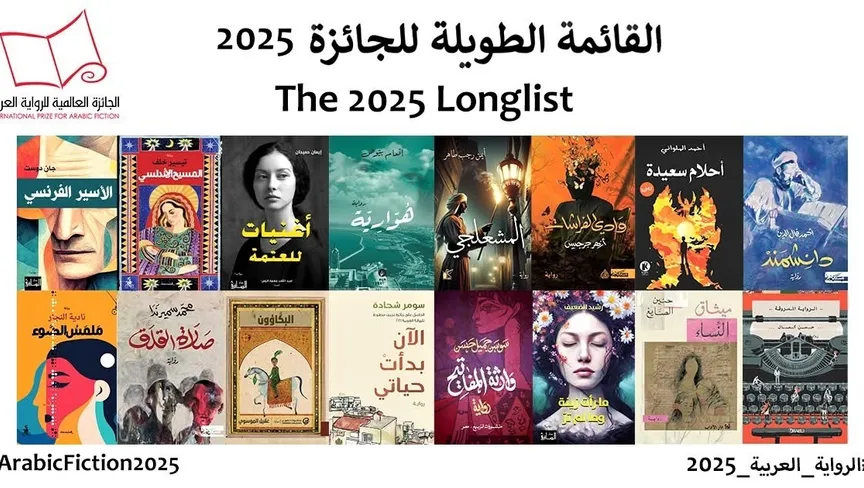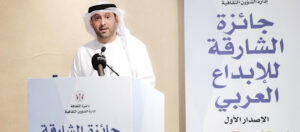The International Prize for Arabic Fiction (IPAF), one of the most prominent prizes for the Arabic novel, has unveiled the longlist for its 2025 edition, featuring 16 outstanding novels.
A total of 124 submissions were received for this prestigious prize, with the longlist carefully selected by a distinguished five-member jury. The panel is chaired by Egyptian academic Mona Baker and includes Bilal Arfa, a Lebanese academic and researcher; Sampsa Peltonen, a Finnish translator; Said Benkrad, a Moroccan academic and critic; and Mariam Al Hashemi, an Emirati critic and academic.
The list includes just four who have previously been recognized by the prize, including Taissier Khalaf (2017 longlist; Sausan Jamil Hasan (2023 longlist); Rashid Al Daif (2012 and 2024 longlists) and Azher Jirjees (2020 longlist & 2023 shortlist).
The 2025 edition of the International Prize for Arabic Fiction (IPAF) has introduced several writers to the longlist for the first time. Among the debut longlisted authors are Ahmed Vall Ould Dine, Ahmed Al Malawany, Ayman Taher, Inam Bioud, Iman Humaydan, Jan Dost, Hasan Kamal, Haneen Al Sayegh, Sumar Shihada, Aqeel Almusawi, Mohamed Samir Nada, and Nadia Al Najjar. This diversity underscores the prize’s continued commitment to recognising fresh voices and celebrating literary excellence across the Arabic-speaking world.
The longlisted novels are: “The Touch of Light” by Nadia Al Najjar from the UAE, published by Al Mutawassit; “Danshmand” by Mauritanian Ahmed Vall Ould Dine, published by Masciliana Editions; and “Happy Dreams” by Egyptian Ahmed Al Malawany, published by Kotopia.
Other novels include “The Valley of the Butterflies” by Azher Jirjees from Iraq, published by Dar Al Rafidain; “The Lamplighter”, published by Kayyan and written by Egyptian Ayman Taher; Houwariya by Algerian Iman Bioud, published by Dar Mim; “Songs for the Darkness” by Lebanese Iman Humaydan, published by Dar Al Saqi; and “The Andalusian Messiah” by Syrian Taissier Khalaf, published by Al Mutawassit.
Other longlisted novels include “The French Prisoner” by Syrian Jan Dost, published by Dar Al Saqi; “The Stolen Novel “by Egyptian Hasan Kamal, published by Diwan; “The Women’s Charter” by Lebanese Haneen Al Sayegh, published by Dar Al Adab; and “What Zeina Saw and What She Didn’t” by Lebanese Rashid Al Daif, published by Dar Al Saqi.
They also include “Heiress of the Keys” by Syrian Sausan Jamil Hasan, published by Al Rabie Publications; “My Life Has Just Begun” by Syrian Sumar Shihada, published by Dar Al Karma; “The Weepers” by Bahraini Aqeel Almusawi, published by Kuwait-based Takween Publishing; and “The Prayer of Anxiety” by Egyptian Mohamed Samir Nada, published by Masciliana Editions.
This year’s longlist is remarkable in its diversity of both theme and literary form. It transports readers to a myriad of worlds and eras. From the bustling streets of Beirut on the night of the devastating port explosion to 1980s Bahrain, and from the Algerian city of Oran during the Black Decade to a Baghdadi cemetery where the dead transform into butterflies, the narratives offer both stark realities and surreal imaginings.
Several novels delve into dystopian realms, depicting hypnotised inhabitants navigating the boundaries between reality and dreams. Others present fictionalised biographies of historical figures and revisit pivotal periods in Arab history, shedding light on everyday life in pre-2011 Syria or the anguish of the Moorish period in Andalusia.
Through these diverse settings, the novels explore the weight of societal and familial pressures, interrogate complex human experiences, and trace the intertwined stories of generations against a backdrop of major political upheaval. These narratives collectively underscore the richness and depth of contemporary Arabic literature.
In her statement, Mona Baker said: “This year’s longlist is remarkable in its diversity of both theme and literary form. Some novels address women’s struggles to achieve their dreams in a patriarchal society that prevents them from living fulfilled lives. Others offer a nuanced portrait of religious and sectarian worlds, where extremism and dogma contrast with human empathy and understanding. Others addressed the topic of repressive regimes and their power to crush the hopes and lives of ordinary people are also explored; some novelists paint a stark picture of this reality, while others employ sarcasm and humour, rendering these difficult topics more accessible for the reader.”
She further noted: “There are several historical novels on the list which deal with both the recent and more distant past, such as the Abbasid era, or the Inquisition and persecution of Muslims in Andalusia. There are also semi-autobiographical books, and others which read like detective stories.”
Yasir Suleiman, chair of the prize’s board of trustees, said: “This longlist continues the trend observed in previous editions, delving into the depths of the present while journeying back to the past. This approach carries sociological significance, shedding light on the harsh realities of the present.”
The winning novel will receive a prize of $50,000, reflecting the award’s commitment to supporting and celebrating excellence in Arabic literature.




